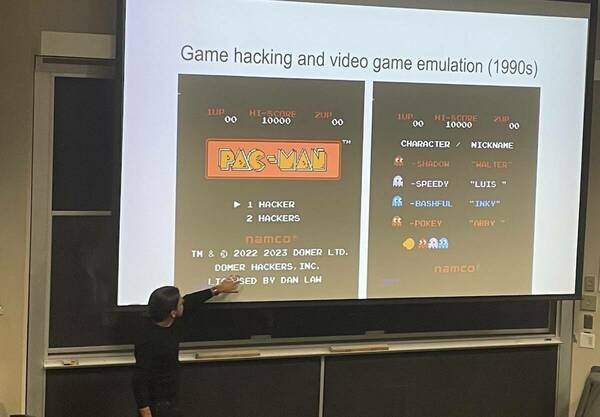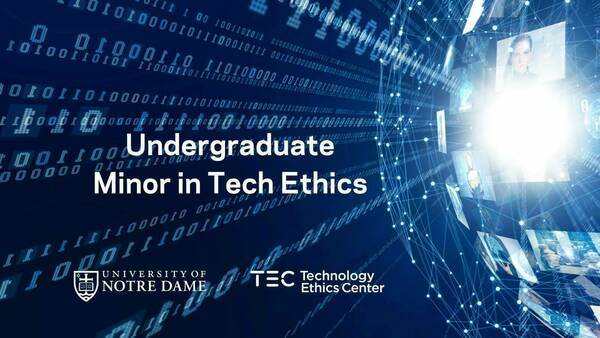
On a gray afternoon in February, Luis Felipe Murillo puts a slide up on the classroom screen before beginning his lesson. It’s a title card for the course, which pops far more than the gloomy weather outside the window:
“The Archaeology of Hacking: Everything You Wanted to Know About Hacking but Were Afraid to Ask.”
Murillo, an anthropologist, is team-teaching the course this semester with Walter Scheirer, a computer scientist. Both are faculty affiliates of the Notre Dame Technology Ethics Center (ND TEC).
The topic on this particular day? Video game hacking.
“In anthropology we study the interplay of technologies in our social lives, but also, and this is the key part, how we are ‘shaped’ by the digital toys, tools, and infrastructures that we build,” says Murillo, who researches questions of ethics, openness, sharing, and collaboration in contemporary science and technology projects.
“This is something we do in this course by bringing anthropological and computational perspectives to interpret the history of hacking as it intersects with the history of electronic games and game consoles, but also with communication technologies that mediate people’s professional, familial, and educational—as well as spiritual and personal—experiences today.”
By this point in the semester, students have already had their own elementary experience of hacking via a technical homework assignment that called on them to modify a game for the original Nintendo Entertainment System.
They are also at work on a semester-long group project where they pick a hacking event in the news to examine in depth. One of the things that Scheirer and Murillo look for the groups to dig into is the ethical implications of the hacks they’re studying so that they can move beyond mainstream conceptions.
“Hacking has always been about pushing the boundaries of technology,” says Scheirer, a specialist in media forensics, computer security, data security, human biometrics, and digital privacy. “And while sometimes the outcome is good, other times it isn't. Understanding that dichotomy in social, legal, and technological terms helps students grasp the big picture when it comes to technology ethics.”
The Minor in Technology Ethics

Cross-listed with the Departments of Anthropology and Computer Science and Engineering, “The Archaeology of Hacking” has been approved as an integration course for the University’s Core Curriculum and can be counted toward several undergraduate minors at the University, including ND TEC’s in technology ethics that was launched last year.
Open to students from all colleges and schools at Notre Dame, the tech ethics minor consists of five courses totaling 15 credits, broken up into a required gateway course, a required advanced seminar on a current issue in tech ethics, and three electives. Electives are taught by faculty members from various disciplines—but especially those from the College of Arts and Letters, College of Engineering, Mendoza College of Business, and Keough School for Global Affairs.
“The Archaeology of Hacking” is one of nine courses being taught this semester designated as a tech ethics elective. Scheirer and Murillo tentatively plan to offer the class again next spring.
A New Elective: “Auditing AI”
A new elective debuting this fall is “Auditing AI: An Introduction.” Developed with support from the Notre Dame-IBM Tech Ethics Lab, ND TEC’s applied arm, the course is part of the lab’s broader Auditing AI Initiative, through which it also sponsored its second annual call for proposals and awarded a total of more than $930,000 to 19 research projects.
Ju Yeon Jung, a postdoctoral fellow at the lab, and Cameron Kormylo, a research associate in the Department of Information Technology, Analytics, and Operations, designed the “Auditing AI” course and will teach it together. Jung notes how the increasingly widespread use of AI makes the course timely.
“Students from both technical and non-technical disciplines will work in groups to apply an AI auditing toolkit to assess a range of AI systems developed from real-world datasets and examples.” —Ju Yeon Jung
“AI audits are emerging as an important solution to systematically identify, evaluate, and address risks associated with AI systems,” Jung says. “This course will offer an interdisciplinary introduction to AI auditing, viewing AI systems as sociotechnical systems that need to be responsive to diverse stakeholders. Students from both technical and non-technical disciplines will work in groups to apply an AI auditing toolkit to assess a range of AI systems developed from real-world datasets and examples.”
In addition to the “Auditing AI” class, the Notre Dame-IBM Tech Ethics Lab is creating a practicum course where student teams will get real-world experience on a capstone project under the guidance of a Notre Dame faculty member and a professional from IBM. The practicum is expected to be offered for the first time in Spring 2024 and will count toward the tech ethics minor.
Tech Ethics Gateway Course as a Second Philo
The tech ethics minor’s gateway course, “Fundamentals of Technology Ethics and Society,” is one that is taught every fall and spring semester. Covering topics such as bias and fairness in algorithms, privacy, data governance and civil liberties, surveillance and power, social media, and the ethics of artificial intelligence, it can be taken as a student’s second philosophy course within the Core Curriculum.
Clayton O’Dell, a sophomore majoring in computer science, says she decided to pursue the tech ethics minor so she’s prepared to ask the kinds of questions about technology that will allow us to build a better future. She’s found the gateway course to be valuable in that regard.
“Students from a range of disciplines help shape the course by providing unique perspectives about moral decisions.” —Clayton O’Dell
“The ‘Fundamentals of Technology Ethics and Society’ is a fascinating course that uses reading assignments to draw students into spirited dialogue on a variety of ethical issues,” O’Dell says. “Students from a range of disciplines help shape the course by providing unique perspectives about moral decisions. Through the course, I’ve enjoyed being challenged to listen and learn from others, allowing me to strengthen and better inform my own beliefs.”
Undergraduate tech ethics courses being offered in fall 2023 are listed below. More information about any of them can be found on Notre Dame’s Class Search website by going to the “Any Department” dropdown menu and selecting “Technology Ethics.” Details about the minor in tech ethics are available at techethics.nd.edu/minor.
| Course | Instructor | Schedule |
|---|---|---|
|
Fundamentals of Technology Ethics and Society (TEC 20101; counts as second philosophy) |
Warren von Eschenbach | TTh 11:00 a.m.–12:15 p.m. |
|
Fundamentals of Technology Ethics and Society (TEC 20101; counts as second philosophy) |
Cody Turner | MW 2:00 p.m.–3:15 p.m. |
|
Science, Technology, & Society (TEC 20112/STV 20556; counts as second philosophy or writing-intensive course) |
Anna Geltzer | TTh 12:30 p.m.–1:45 p.m. |
|
The Language of Science (TEC 23201/STV 23201) |
Sahana Srinivasan | TTh 9:30 a.m.–10:45 a.m. |
|
Auditing AI: An Introduction (TEC 30114/CDT 30614) |
Cam Kormylo | MW 11:00 a.m.–12:15 p.m. |
|
Generative AI in the Wild (TEC 30750/CDT 30750) |
MW 2:00 p.m.–3:15 p.m. |
|
|
Internet Ethics (TEC 33997/CDT 30797; counts as second philosophy) |
Cody Turner | MW 11:00 a.m.–12:15 p.m. |
Originally published by at techethics.nd.edu on April 06, 2023.
